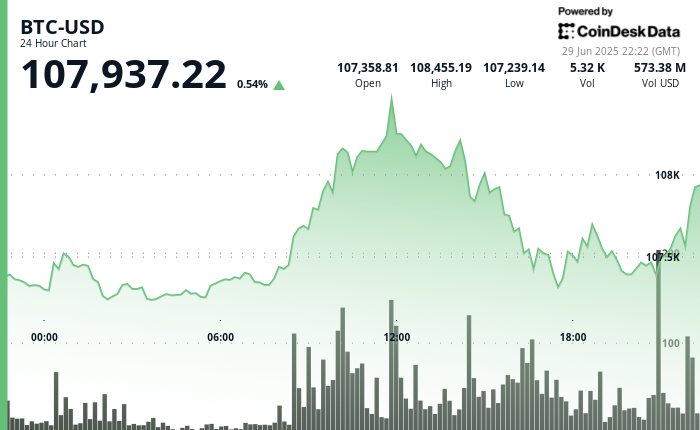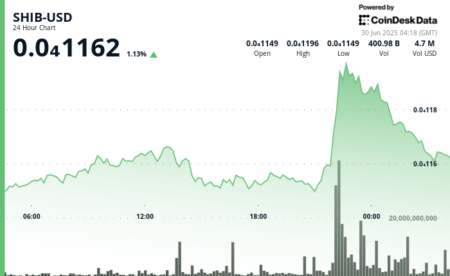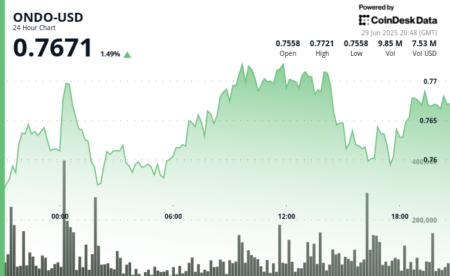Bitcoin’s Trending Movements Amid Fiscal Policy Debates
As of late Sunday evening, Bitcoin (BTC) has reached a trading price of $107,937, marking a modest increase of 0.54% in the past 24 hours. This price fluctuated between $107,194 and $108,489 during the day, reflecting the inherent volatility of cryptocurrency markets. Attention has shifted towards fiscal policy tensions in Washington, particularly following former President Trump’s recent comments on Truth Social, which stirred discussions about the Republican party’s approach to tax and spending policies.
Trump’s post addressed Republican lawmakers amidst a heated debate over his expansive tax-and-spending proposal, informally dubbed the "One Big Beautiful Bill." This comprehensive legislation proposes approximately $3.8 trillion in tax cuts, accompanied by targeted spending reductions and an increase in national defense and border security funding. The bill seeks to make permanent several tax breaks from Trump’s 2017 Tax Cuts and Jobs Act, including the elimination of taxes on tips and overtime pay while suggesting an increase in the child tax credit to $2,200 for some families.
These proposals have ignited significant internal debate among Republicans, with moderate members from high-tax states advocating for higher limits on state and local tax deductions (SALT). In contrast, more conservative elements within the party push for deeper cuts, particularly to programs like Medicaid. Trump’s recent comments reflect an attempt to maintain unity within the party by urging fiscal restraint while asserting that economic growth will offset revenue losses.
Crypto analysts are weighing in on these fiscal discussions, indicating that traditional fixed-income assets, such as U.S. Treasuries, may lose their allure amidst a potential for increased inflation and currency debasement as deficits rise. Analysts like Will Clemente expressed skepticism towards holding long-term U.S. Treasuries at current yields, suggesting that Bitcoin and gold may serve as better hedges against potential economic instability. The perception of Bitcoin as a store of value is gaining traction, especially as fiscal risks associated with rising national debt mount.
Amidst these discussions, the Senate is racing to finalize the proposed bill ahead of the Fourth of July holiday. The outcome of this legislative effort is uncertain, as lawmakers work to find a balance between tax relief, spending cuts, and political viability. The implications of these discussions extend beyond immediate financial metrics, potentially influencing the broader economic landscape and the appeal of cryptocurrencies as alternative investments.
The technical analysis shows that from June 28, between 15:00 UTC and June 29, Bitcoin experienced trading from $107,194 to $108,489, establishing support at around $107,300. Multiple rebounds were noted, suggesting upward momentum. However, Bitcoin’s price saw slight downward movements in the subsequent hours, reaching a minor dip to $107,937 by 22:22 UTC. The fluctuations highlight the ongoing volatility characteristic of cryptocurrency trading, presenting both opportunities and risks for investors.
The state of the market as it intertwines with political discourse signifies a complex landscape for Bitcoin and other cryptocurrencies. As potential investors focus on macroeconomic indicators, the intertwining of fiscal policy and digital currency valuations will likely shape investment strategies moving forward. Understanding these relations is essential for navigating both immediate and long-term investment decisions in an ever-evolving financial ecosystem.
In summary, Bitcoin’s price movements are not only influenced by market dynamics but are also closely tied to broader political debates surrounding fiscal policy. As shown in recent trends, investor sentiment is swayed by the implications of policy changes, underscoring the importance of staying informed about both cryptocurrency and governmental fiscal developments.

















